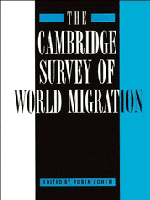Book contents
- Frontmatter
- Contents
- List of illustrations
- List of tables
- Notes on the contributors
- 1 Prologue
- 2 European colonization and settlement
- 3 Asian indentured and colonial migration
- 4 The great Atlantic migration to North America
- 5 Migration in Europe, 1800–1950
- 6 Migration in Africa
- 7 Latin and Central American migration
- 8 Migration to North America after 1945
- 9 Labour migration to western Europe after 1945
- 10 Repatriates and colonial auxiliaries
- 11 Migration in Asia and Oceania
- 12 Migration in the Middle East
- 13 Refugees from political conflict
- 14 Migrants and asylum-seekers in contemporary Europe
- 15 Emerging trends
- Acknowledgements and credits
- Index
13 - Refugees from political conflict
Published online by Cambridge University Press: 05 December 2012
- Frontmatter
- Contents
- List of illustrations
- List of tables
- Notes on the contributors
- 1 Prologue
- 2 European colonization and settlement
- 3 Asian indentured and colonial migration
- 4 The great Atlantic migration to North America
- 5 Migration in Europe, 1800–1950
- 6 Migration in Africa
- 7 Latin and Central American migration
- 8 Migration to North America after 1945
- 9 Labour migration to western Europe after 1945
- 10 Repatriates and colonial auxiliaries
- 11 Migration in Asia and Oceania
- 12 Migration in the Middle East
- 13 Refugees from political conflict
- 14 Migrants and asylum-seekers in contemporary Europe
- 15 Emerging trends
- Acknowledgements and credits
- Index
Summary
Throughout this Survey I have been cognizant of the incidence of refugee migration, and of the sudden displacement of people during periods of war and state formation. By the last quarter of the twentieth century refugee migration has become the most visible and the most sensitive form of world migration. The numbers too are startling – getting on, by UN 1995 estimates, for 20 million people. Of course one has to be very careful about evaluating such a figure. Displaced people, victims of civil wars and those fleeing natural disasters (‘ecological refugees’) are often included – certainly a good proportion of the total would not conform to the definitions of a (political) refugee laid down in the 1951 Geneva Convention. On the other hand, it is arguable that the Convention was drafted with post-war European conditions in mind and that it is in any case being selectively and too narrowly applied by governments anxious to limit the asylum claims even of genuine refugees.
Many of the most dramatic refugee flows have occurred in Africa, the pathetic victims looking sadly at the television cameras that beam their images onto our television screens. It is all too easy to jump to the conclusion that Africa is simply a benighted place, struck by random famines and oppressed by endemic and inevitable ‘tribal’ conflicts. What, so the thought runs, can possibly be done other than to place a few coins in a collection box for the world's victims?
- Type
- Chapter
- Information
- The Cambridge Survey of World Migration , pp. 431 - 466Publisher: Cambridge University PressPrint publication year: 1995



